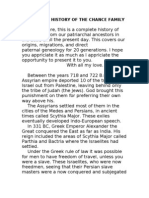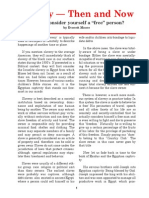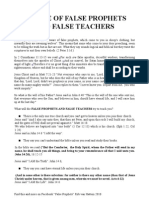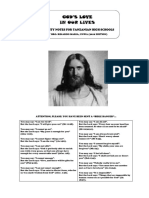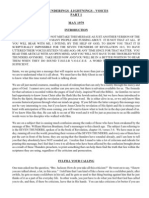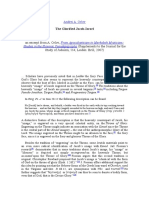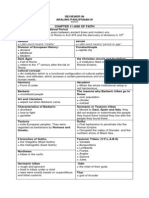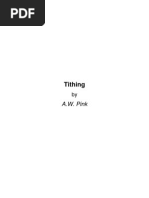Excursus: The Hebrew Word Segullah
Excursus: The Hebrew Word Segullah
Uploaded by
Adam PaytonCopyright:
Available Formats
Excursus: The Hebrew Word Segullah
Excursus: The Hebrew Word Segullah
Uploaded by
Adam PaytonOriginal Description:
Original Title
Copyright
Available Formats
Share this document
Did you find this document useful?
Is this content inappropriate?
Copyright:
Available Formats
Excursus: The Hebrew Word Segullah
Excursus: The Hebrew Word Segullah
Uploaded by
Adam PaytonCopyright:
Available Formats
EXCURSUS
THE HEBREW WORD SEGULLAH
Psalm 135:4 is the only place in the psalms where the Hebrew word hL;gUs] (sgullh) is used. It is found only eight times in the whole Hebrew Bible (Exod 19:5; Deut 7:6; 14:2; 26:18; Ps 135:4; 1 Chr 29:3; Eccl 2:8; Mal 3:17). Yet, in spite of its limited usage, it is a key term for understanding the privileges and responsibilities that God gave to Israel and the Church with regard to their mission in the world. For convenience sake we will refer to the word in an adapted transliteration: segullah. The literal use of the word is found in two late passages. In 1 Chr 29:3 David recounts how he is giving part of his personal treasure to the accumulation of materials for the temple that his son Solomon will build: Besides, in my devotion to the temple of my God I now give my personal treasures (segullah) of gold and silver for the temple of my God, over and above everything I have provided for this holy temple. Segullah refers to the kings personal cache of precious gold and silver, apparently collected over a period of years of conquests and perhaps trade (see 2 Sam 8:11). In Eccl 2:8a the son of David (Solomon) says: I amassed silver and gold for myself, and the treasure (segullah) of kings and provinces. Apparently, the silver and gold is in apposition to the word segullah. It is a kings most prized treasure. These two literal usages accord with the same word found in Akkadian and Ugarit. In Akkadian legal documents, sikiltu refers to movable goods that a person has acquired (saklu) either justly or unjustly, or that a person has put aside. 1 The Akkadian word, sakalu, means to acquire property and sikiltum, means personal property. A royal seal ascribes to King Abban the epithets servant of Haddus, favorite of Haddus, most personal property [sikiltum] of the la[dy]? 2 In Ugarit the last Hittite suzerain writes a letter to his vassal to remind him that he is his servant [and] his property [sglth]. 3 This usage is very close to the metaphorical use of segullah in the remainder of the Old Testament passages. Thus segullah comes to mean a dear personal possession, a treasure only in the sense of that which is treasured or cherished. 4 God said to Moses at the foot of Mount Sinai: Now if you obey me fully and keep my covenant, then out of all nations you will be my treasured possession [segullah]. Although the whole earth is mine, you will be for me a kingdom of priests and a holy nation (Exod 19:5-6). Israel is viewed as Yahwehs personal possession, not through inheritance, but rather through the putting aside of a reserve from the possessions of the Most High. . . . This kind of acquired possession is valued more highly, and the word ultimately becomes the designation for any possession that one especially values. 5 Israel, as a treasured possession, must be holy in order to be a kingdom of priests to the world. Deuteronomy has the word strategically placed in three verses. Deuteronomy 7:6 is in the context of Gods instructions concerning the conquest and the destruction of the wicked Canaanites (Deut 7:1-5). Deuteronomy 7:6: For you are a people holy to the LORD your God. The LORD your God has chosen you out of all the peoples on the face of the earth to be his people, his treasured possession [segullah]. As in Exodus, the people are chosen by God and they are to be holy. They have not been chosen because they are a great nation, for they are few in number by comparison (Deut 7:7). Nor have they been set apart as holy because they are an obedient people (Deuteronomy 9). It is because God is a covenant-keeping God and faithful to his promises (Deut 7:8,9). Deuteronomy 14:2 is set in a context of detestable pagan practices that the Israelites are to avoid (as in Deut 7:6): For you are a people holy to the LORD your God. Out of all the peoples on the face of the earth, the LORD has chosen you to be his treasured possession [segullah]. Again, the ideas of being chosen, holy, avoiding evil, and obedience are found in the context. Finally, Deut 26:18 is at the end of the stipulations (Deuteronomy 526), before the ratification with curses and blessings (Deuteronomy 2728): And the LORD has declared this day that you are his people, his treasured possession [segullah] as he promised, and that you are to keep all his commands. We must remember that Moses is addressing a new generation emerging out of the desert to conquer the promised land. The old rebellious generation has died in the wilderness. Besides emphasizing obedience as part of being Gods segullah, Moses adds: He has declared that he will set you in praise, fame and honor high above all the nations he has made and that you will be a people holy to the LORD your God, as he promised (Deut 26:19). Besides the responsibilities of obedience and being holy, there are privileges of praise, fame and honor given to the new generation. Only one prophet, Malachi, used the word: They will be mine, says the LORD Almighty, in the day when I make up my treasured possession [segullah]. I will spare them, just as in compassion a man spares his son who serves him (Mal 3:17). The context suggests that the few who fear Yahweh (Mal 3:16) will at least be part of this new rich treasure of God, a group of people who will righteously serve him in the future (see Mal 3:184:5). But first Elijah must come to usher in that day of the LORD when God will make up his new segullah! In Ps 135:4 the term segullah is used in parallel with chosen (as in Deut 7:6). The whole context of the psalm touches on all the contexts we have seen above that Israel is special above the pagan nations and their gods (Ps 135:5,5-18), for Israels God is the Creator and Sovereign over the earth (Ps 135:6-7). He has saved his people from slavery, struck down great kings, and given them land as an inheritance (Ps 135:8-12). This is why, as Gods segullah, the people praise and bless his name (Ps 135:1-3,19-21). Thus, in summary, segullah is used in similar ways in Hebrew as it was with other languages such as Akkadian and Ugarit
a covenant context with kingdom servants involved as a chosen treasure. Segullah will be found in the New Testament as well. Before we examine its New Testament use, we must first see how the Septuagint translated the word segullah. There are basically two Greek words used to translate segullah in the Old Testament. They are synonyms for the idea of possession, treasured possession, rich treasure, or most prized treasure. Periouvsio~ (periousios) or a form of it is used most often (seven times), while peripoivhsi~ (peripoisis) and its verb form are used only twice. Interestingly, the usage of these two synonyms will be reversed in the New Testament. The word, periousiasmo;~ (periousiasmos, private possession) is found in Ps 134:4, LXX (135:4 Hebrew/English) and Eccl 2:8. A similar word, periousios (rich treasure, that which is over and above, surplus, abundance, having more than enough, wealthy), is found five times: Exod 19:5; Deut 7:6; 14:2; 26:18; and Exod 23:22. The latter reference is not based on segullah in the Hebrew text. It seems the Septuagint has inserted a similar phrase from Exod 19:5,6 into Exod 23:22. In 1 Chr 29:3 the Septuagint has used a verb form, peripoievomai (peripoieomai, keep safe, preserve, cause to remain over and above), to translate segullah. The same word is used in Isa 43:21, but segullah is not in the Hebrew text there. (However, 1 Pet 2:9 uses the last phrase of this verse in its quote of Exod 19:5,6: that they may proclaim my praise.) Finally, the noun form of the verb above, peripoisis (keeping safe, preservation, gaining possession of, acquisition), is found in Mal 3:17. These two Greek words are used six times in the New Testament. The most used word in the Septuagint is used only once Titus 2:14 who gave himself for us to redeem us from all wickedness and to purify for himself a people that are his very own [lao;n periouvsion, laon periousion], eager to do what is good. By Jesus work of redemption God has created for Himself a people which is for Him a costly possession, a choice treasure. 6 The other five references use the word peripoivhsi~ (peripoisis; 1 Pet 2:9; Eph 1:14; Heb 10:39; 1 Thess 5:9; and 2 Thess 2:14). The verb form of this noun is found three times in the New Testament (cf. Luke 17:33; Acts 20:28; and 1 Tim 3:13), but only Acts 20:28 has a possible connection to the concept of segullah: Keep watch over yourselves and all the flock of which the Holy Spirit has made you overseers. Be shepherds of the church of God, which he bought (periepoihvsato, periepoisato) with his own blood. The Church is viewed as purchased by the blood of Jesus a most expensive price indeed! First Peter 2:9: But you are a chosen people, a royal priesthood, a holy nation, a people belonging to God [lao;~ eij~ peripoivhsin, laos eis peripoisin], that you may declare the praises of him who called you out of darkness into his wonderful light. It is certain that Peter is referring to Exod 19:5,6 for this paraphrase. But he uses peripoiesis rather than the Septuagint use of periousios. Just as Ps 135:4 uses the word chosen as a parallel with segullah, so Peter sandwiches the two middle words (a royal priesthood, a holy nation) between chosen people and a people belonging to God, i.e., segullah. He also alludes to Isa 43:21 (LXX only) for his last phrase that you may declare the praises of him which uses the verb form peripoieomai (see above). Also quoting from Hosea (Hos 1:9,10; 2:23), Peter reminds his Gentile Christians that once they were not a people but now they are the people of God (1 Pet 2:10a). The NIV translation, a people belonging to God is quite weak. A stronger translation is needed, something like: a people for [Gods] crown jewel or most prized treasure. Ephesians 1:14: who is a deposit guaranteeing our inheritance until the redemption of those who are Gods possession [th'~ peripoihvsew~, ts peripoises] to the praise of his glory. The ultimate goal of God in his great scheme of redemption is the salvation of his crown jewel, the Church! All of creation awaits the Churchs salvation (see Rom 8:19). Hebrews 10:39: But we are not of those who shrink back and are destroyed, but of those who believe and are saved [eij~ peripoivhsin yuch'~, eis peripoisin psychs]. Where is the word for segullah in the English? The noun, peripoisis, has been translated as a verb, are saved. Perhaps in a literal sense it should have been translated: unto a preservation of the soul, i.e., life. While this is possible, a better approach is suggested. Several years ago while teaching this word study to a Bible School class of young adults in Pittsburgh, I registered my consternation as to how to understand this particular reference. A young lady who was studying ancient metallurgy at the university reminded me of the context and how that context helps interpret the imagery of purifying precious metals. The author of Hebrews reminds his readers they have only lost their real estate, nonmovable treasure (v. 34) and they had more lasting possessions than that. Jesus is our model of one who did not shrink back but held firmly to the task of living by faith[fulness] (vv. 35-38, quoting Hab 2:3,4). Therefore, the biblical writer says: But we are not of [those who are] shrinking back unto destruction, but of [those who are] faithful unto a living treasure. In the process of purifying precious metals (such as silver or gold), the dross under a very hot fire rises to the top and shrinks back to the sides of the cauldron. The purified metal (silver or gold?) is then poured out for safe-keeping, while the dross is scraped off the sides of the cauldron and thrown away. This is the imagery of the verse. We may lose our property to persecution, but through this purification process (the testing of fire), we who are faithful (firm throughout) become a living (movable) treasure to God. One day we will be richly rewarded (v. 35b). Peripoisis is used in 1 Thess 5:9 and 2 Thess 2:14, but in these two references the noun in question is turned into a verb with an object in the genitive case (usually the genitive case describes something, but it can function as the object of a verb). First Thessalonians 5:9: For God did not appoint us to suffer wrath but to receive salvation [eij~ peripoivhsin swthriva~, eis peripoisin strias] through our Lord Jesus Christ. Our word is translated to receive and its object (salvation) is in the genitive case, which in a literal translation would read: unto possession of salvation. The context and structure of this
verse reminds one of Heb 10:39. I suggest the following: For God did not appoint us unto wrath but unto a saved treasure (or unto a treasure for salvation). The very next verse (v. 10) explains how we have become a saved treasure to God by the death of his Son (cp. Acts 20:28)! Perhaps a linguistic theory approach will not allow us to translate it this way, but I make the suggestion strongly. Second Thessalonians 2:14: He called you to this through our gospel, that you might share in the glory [eij~ peripoivhsin dovxh~, eis peripoisin doxs] of our Lord Jesus Christ. Our word is translated share in with the object as glory. However, the context has some of the same ideas and structure as we have seen in the certain passages for segullah: God chose you (v. 13). I suggest the translation: Unto which he called you through our gospel, [that you may be] for a glorious treasure of our Lord Jesus Christ. Again, linguistic analysis may not allow us to translate the Greek so literally or stilted, but nevertheless, I make the suggestion.7 While 1 Thess 5:9; 2 Thess 2:14; and Hebrews 10:39 are questionable references to the use of the Old Testament concept of segullah, there is no question about Eph 1:14, Titus 2:14, and 1 Pet 2:9. The Church is called by God to be his segullah people, his crown jewel, a most prized treasure. They are chosen, called to be a kingdom of priests, a holy nation. They have the indwelling Spirit that enables them to say No to ungodliness and worldly passions and to say Yes to self-controlled, upright, and godly lives. Gods segullah people are eager to do what is right. They live this way as they await the day of redemption to the praise of Gods glory! There is no greater privilege than to be called Gods segullah his most prized treasure. On the other hand, there is no greater responsibility involved because the witness to the one true God is at stake. We are mediators between a world ready for destruction and the God who is waiting to add to his treasured people. Understanding the meaning of segullah helps one understand Psalm 135 more in-depth.
E. Lipinski, article on segullah in TDOT, X:145. See pp. 144-148 for entire article. Ibid., p. 146. 3 Ibid. 4 Moshe Greenberg, Hebrew segullah: Akkadian sikiltu, JAOS 71 (1951): 174. 5 Ibid., pp. 147, 148. 6 H. Preisker, article on periousios in Theological Dictionary of the New Testament, ed. by G. Friedrich, Volume VI, translated by G.W. Bromiley (Grand Rapids: Eerdmans, 1968), p. 58. See pp. 57-58 for the article. 7 I do not agree with the translations presented by the article on peripoieomai in The New International Dictionary of New Testament Theology, vol. 2, ed. by Colin Brown (Grand Rapids: Zondervan, 1977), p. 839. The readings follow the RSV and NRSV. The verses affected are: Eph 1:14; 1 Thess 5:9; 2 Thess 2:14; Heb 10:39. Segullah does not seem to be the basis for translating peripoisis, in these verses.
2
You might also like
- DIY Do It Yourself - City Church RestorationDocument112 pagesDIY Do It Yourself - City Church Restorationjuanse7100% (1)
- Sunday School Exam Papers-2Document7 pagesSunday School Exam Papers-2Harshini Ramas50% (4)
- Israels Feasts and Their FullnessDocument25 pagesIsraels Feasts and Their FullnessGaylin ReadNo ratings yet
- Rose Bible Echarts - CJSB Intro To Jewish Holy Days Passover PesachDocument7 pagesRose Bible Echarts - CJSB Intro To Jewish Holy Days Passover PesachEmanuelNo ratings yet
- The Prophet Jeremiah Monday Night Study GuideDocument46 pagesThe Prophet Jeremiah Monday Night Study GuidejbfellowshipNo ratings yet
- The Highest Form of WorshipDocument6 pagesThe Highest Form of Worshipwilfredo torresNo ratings yet
- A Complete History of The Chance FamilyDocument6 pagesA Complete History of The Chance FamilyTiffany Chance100% (1)
- Why Are You Still SingleDocument12 pagesWhy Are You Still SingleRoy DeeNo ratings yet
- Jonah 1 - Small Group QuestionsDocument1 pageJonah 1 - Small Group QuestionsJeova SalesNo ratings yet
- Complete Guide To Killing GoyDocument10 pagesComplete Guide To Killing GoyIpsissimusNo ratings yet
- Paul's Contradictions of JesusDocument46 pagesPaul's Contradictions of JesuschubbychubNo ratings yet
- Christ On The Jewish RoadDocument226 pagesChrist On The Jewish Roadmonktheop1155No ratings yet
- Yada Yah - Volume 2 Invitations - 08 - Kippurym - Reconciliations - Answering The Invitation...Document104 pagesYada Yah - Volume 2 Invitations - 08 - Kippurym - Reconciliations - Answering The Invitation...yadayahNo ratings yet
- Discipulado en El Contexto JudíoDocument18 pagesDiscipulado en El Contexto JudíoRichard RichardNo ratings yet
- Mephibosheth and The King: A Story of Covenant Chesed II Samuel 9Document6 pagesMephibosheth and The King: A Story of Covenant Chesed II Samuel 9CotedivoireFreedomNo ratings yet
- Slavery - Then and Now: Do You Consider Yourself A "Free" Person?Document7 pagesSlavery - Then and Now: Do You Consider Yourself A "Free" Person?shadrekNo ratings yet
- A Magazine For Clergy I September 1982: How Seriously Should We Take Marriage?Document32 pagesA Magazine For Clergy I September 1982: How Seriously Should We Take Marriage?igorbosnicNo ratings yet
- There Are Many Different Thunders DoctrinesDocument93 pagesThere Are Many Different Thunders DoctrinesJoe Manuel Morales Moraga100% (1)
- The Mistakes of King David PDFDocument3 pagesThe Mistakes of King David PDFMarilen De Leon EbradaNo ratings yet
- Story of MosesDocument7 pagesStory of MosesJoel S. CalhounNo ratings yet
- I. Worship and The KingdomDocument10 pagesI. Worship and The KingdombiancasaquinNo ratings yet
- Martini2009 PDFDocument266 pagesMartini2009 PDFIvanovici Daniela100% (1)
- Mbs 063 MDocument18 pagesMbs 063 MjallahhiamaNo ratings yet
- TheocracyDocument97 pagesTheocracyPablo Salazar100% (1)
- Moses' Encounter With Pharaoh: Missions in The Old TestamentDocument1 pageMoses' Encounter With Pharaoh: Missions in The Old TestamentGoran JovanovićNo ratings yet
- False ProphetsDocument3 pagesFalse ProphetsRob Van HattemNo ratings yet
- Divinity NotesDocument110 pagesDivinity NotesMuli sa EmmanuelNo ratings yet
- Jesus Is God and YahwehDocument2 pagesJesus Is God and YahwehTyrone Marcial Valdez LopezNo ratings yet
- Ps110 Right HandDocument2 pagesPs110 Right HandTavi100% (2)
- FIT - Manna & QuailDocument2 pagesFIT - Manna & Quailminnale92No ratings yet
- Mark 10Document10 pagesMark 10Ralph Gerard Saldajeno ValdespinaNo ratings yet
- El Origen de La BibliaDocument67 pagesEl Origen de La BibliafernandoduartelaraNo ratings yet
- The Apocalypse - The Wise Shall Understand, A Commentary On The RevelationDocument295 pagesThe Apocalypse - The Wise Shall Understand, A Commentary On The RevelationDesmond AllenNo ratings yet
- Deuteronomy Epworth-Commentaries ClementsDocument174 pagesDeuteronomy Epworth-Commentaries ClementsTumelo Silas MotsieNo ratings yet
- Mark Chapter 01Document9 pagesMark Chapter 01waltoakleyNo ratings yet
- Ingredients For The AnointingDocument3 pagesIngredients For The Anointingapi-384940175% (4)
- Torah Sparks 5768Document171 pagesTorah Sparks 5768api-3811809100% (3)
- Thunderings - Lightnings - Voices MAY 1979Document22 pagesThunderings - Lightnings - Voices MAY 1979Bot PsalmernaNo ratings yet
- The Covenant and Journey To Canaan: Importance of Sinai CovenantDocument2 pagesThe Covenant and Journey To Canaan: Importance of Sinai CovenantRosewenda Alfas CartagenaNo ratings yet
- 06-13-2010 Strategic Level WarfareDocument32 pages06-13-2010 Strategic Level Warfarekingswaycommunity100% (2)
- The Day of AtonementDocument52 pagesThe Day of AtonementBill CreasyNo ratings yet
- The Cross and The Sanctuary IVDocument2 pagesThe Cross and The Sanctuary IVuniversitysda100% (1)
- Psychology of Prophetism A Secular Look at The Bible Book by KoenraadDocument177 pagesPsychology of Prophetism A Secular Look at The Bible Book by KoenraadHarish KumarNo ratings yet
- Hebrewbooks Org 33449Document356 pagesHebrewbooks Org 33449Cris Elias MuñozNo ratings yet
- Pro GospelDocument10 pagesPro GospelFrederyck TeixeiraNo ratings yet
- "The Context of The Prophets": An IntroductionDocument16 pages"The Context of The Prophets": An IntroductionPortia SumabatNo ratings yet
- The Teachings of Jesus: Benjamin L. MerkleDocument9 pagesThe Teachings of Jesus: Benjamin L. MerkleHemiush Nokrek MarakNo ratings yet
- Dispensationalism by David Dunlap EnlargeDocument20 pagesDispensationalism by David Dunlap EnlargeRandellNo ratings yet
- Chapter 3 Egypt and Exodus AnswersDocument5 pagesChapter 3 Egypt and Exodus AnswersWarren JarabeNo ratings yet
- Rosh Hashanah 5776 The Worlds Birth - Tikkun Hanefesh-RabbizDocument9 pagesRosh Hashanah 5776 The Worlds Birth - Tikkun Hanefesh-RabbizmauroNo ratings yet
- Evangelizology Chapter 10Document130 pagesEvangelizology Chapter 10eltropicalNo ratings yet
- DeliverancenewDocument1 pageDeliverancenewNana KwakuNo ratings yet
- Prophets - Biblical Studies - Oxford BibliographiesDocument23 pagesProphets - Biblical Studies - Oxford BibliographiesSamanthaNo ratings yet
- PASSOVER: A Summary of Our Current UnderstandingDocument57 pagesPASSOVER: A Summary of Our Current UnderstandingMustardSeedNews100% (1)
- A Climax To ExodusDocument13 pagesA Climax To ExodusRedeemer Bible Church/Solid Food Media100% (1)
- All About The MessiahDocument5 pagesAll About The Messiahdougmungavin3744No ratings yet
- Consider AbrahamDocument4 pagesConsider Abrahamwilfredo torresNo ratings yet
- The Glorified Jacob-Israel - Andrei OrlovDocument6 pagesThe Glorified Jacob-Israel - Andrei OrlovLeandroMaiaNo ratings yet
- A Lesson From The Life of MosesDocument3 pagesA Lesson From The Life of MosesHv EstokNo ratings yet
- The Hebrew Gospels From Sepharad - Matthew Version 2.2Document117 pagesThe Hebrew Gospels From Sepharad - Matthew Version 2.2bill spurlockNo ratings yet
- Family Discipleship PlanDocument4 pagesFamily Discipleship PlanISAIAH MUSAFARE MAGAYANo ratings yet
- Amazing GraceDocument269 pagesAmazing GraceOvidiu IosipescuNo ratings yet
- Natureofevil029305mbp PDFDocument476 pagesNatureofevil029305mbp PDFhsprgNo ratings yet
- Book of JONAH: God's Power and God's MercyDocument8 pagesBook of JONAH: God's Power and God's MercyJanine FaustinoNo ratings yet
- Problems of PeriodizationDocument16 pagesProblems of PeriodizationRoxana Cusma50% (2)
- Proudfoot, Religious ExperienceDocument5 pagesProudfoot, Religious ExperienceRoberto E. GarcíaNo ratings yet
- 2020 4° Secundaria Francisco Pampa 4 º Eti Rep Sec 4 de Mayo de 2020Document3 pages2020 4° Secundaria Francisco Pampa 4 º Eti Rep Sec 4 de Mayo de 2020MayraPerezNo ratings yet
- Notes Kenneth Copeland-Trk-20190206Document13 pagesNotes Kenneth Copeland-Trk-20190206Raghunath Korani100% (1)
- David Daube - Essays On Some NT ThemesDocument153 pagesDavid Daube - Essays On Some NT ThemesMihalache CosminaNo ratings yet
- (Supplements To Novum Testamentum 023) L. Gaston - No Stone On Another 1970Document547 pages(Supplements To Novum Testamentum 023) L. Gaston - No Stone On Another 1970Novi Testamenti Lector100% (4)
- Spiritual Body and Celestial Earth - From Mazdean Iran To Shiite Iran - Henry CorbinDocument17 pagesSpiritual Body and Celestial Earth - From Mazdean Iran To Shiite Iran - Henry CorbinMoreno Nourizadeh100% (3)
- Aramaic and Hebrew The Languages SpokenDocument15 pagesAramaic and Hebrew The Languages SpokenmariaNo ratings yet
- Philippians Bible Study Lesson1Document9 pagesPhilippians Bible Study Lesson1ChristianVictory100% (1)
- A Biblical Study of Christ's Redemptive Healing WorkDocument23 pagesA Biblical Study of Christ's Redemptive Healing WorkkingzzubNo ratings yet
- Moed Katan 25Document88 pagesMoed Katan 25Julian Ungar-SargonNo ratings yet
- Jewish Standard, February 8, 2018Document56 pagesJewish Standard, February 8, 2018New Jersey Jewish StandardNo ratings yet
- Cambridge IGCSE ™: Religious Studies 0490/13 October/November 2022Document17 pagesCambridge IGCSE ™: Religious Studies 0490/13 October/November 2022walterkalu385No ratings yet
- Kabbalah - WikipediaDocument27 pagesKabbalah - WikipediaWilhelm Richard WagnerNo ratings yet
- A Paper Presenration On Urban MissionDocument6 pagesA Paper Presenration On Urban MissionSamson M SamsonNo ratings yet
- Evening Prayer IIDocument48 pagesEvening Prayer IIBonirie Tabada RosiosNo ratings yet
- Reviewer in Araling Panlipunan IIIDocument5 pagesReviewer in Araling Panlipunan IIIJerez OrayleNo ratings yet
- Tithing A.W. PinkDocument20 pagesTithing A.W. PinkdannomccNo ratings yet
- A Look Into Kindergarten: Bible: PhonicsDocument2 pagesA Look Into Kindergarten: Bible: Phonicsapi-475628377No ratings yet
- ChordsDocument3 pagesChordsJoyce GohNo ratings yet
- Wellesley CalendarDocument1 pageWellesley CalendarAlex NewmanNo ratings yet
- Marking Schehe: 1991-CE-REL-STUD (B) Marking Scheme Page 1of 7Document7 pagesMarking Schehe: 1991-CE-REL-STUD (B) Marking Scheme Page 1of 7api-3826629No ratings yet
- Lectionary Readings From The Acts of The ApostlesDocument2 pagesLectionary Readings From The Acts of The ApostlesDzaine RomeroNo ratings yet






